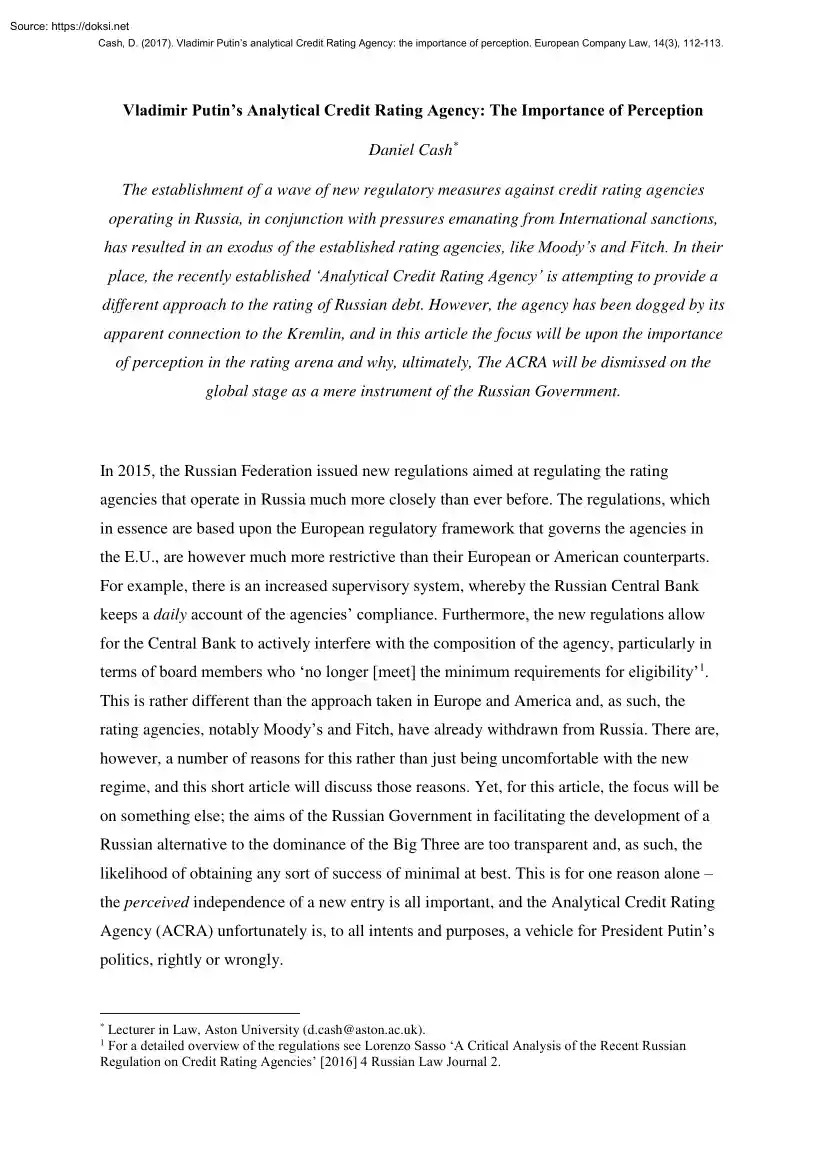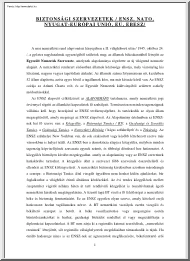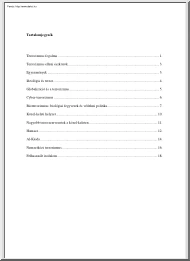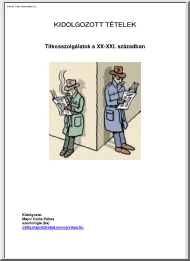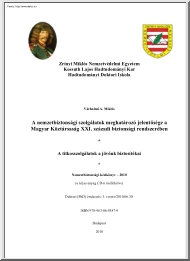Datasheet
Year, pagecount:2017, 4 page(s)
Language:English
Downloads:6
Uploaded:March 07, 2022
Size:789 KB
Institution:
-
Comments:
Attachment:-
Download in PDF:Please log in!
Comments
No comments yet. You can be the first!
Content extract
Cash, D. (2017) Vladimir Putin’s analytical Credit Rating Agency: the importance of perception European Company Law, 14(3), 112-113 Vladimir Putin’s Analytical Credit Rating Agency: The Importance of Perception Daniel Cash* The establishment of a wave of new regulatory measures against credit rating agencies operating in Russia, in conjunction with pressures emanating from International sanctions, has resulted in an exodus of the established rating agencies, like Moody’s and Fitch. In their place, the recently established ‘Analytical Credit Rating Agency’ is attempting to provide a different approach to the rating of Russian debt. However, the agency has been dogged by its apparent connection to the Kremlin, and in this article the focus will be upon the importance of perception in the rating arena and why, ultimately, The ACRA will be dismissed on the global stage as a mere instrument of the Russian Government. In 2015, the Russian Federation issued new regulations aimed
at regulating the rating agencies that operate in Russia much more closely than ever before. The regulations, which in essence are based upon the European regulatory framework that governs the agencies in the E.U, are however much more restrictive than their European or American counterparts For example, there is an increased supervisory system, whereby the Russian Central Bank keeps a daily account of the agencies’ compliance. Furthermore, the new regulations allow for the Central Bank to actively interfere with the composition of the agency, particularly in terms of board members who ‘no longer [meet] the minimum requirements for eligibility’1. This is rather different than the approach taken in Europe and America and, as such, the rating agencies, notably Moody’s and Fitch, have already withdrawn from Russia. There are, however, a number of reasons for this rather than just being uncomfortable with the new regime, and this short article will discuss those reasons. Yet, for
this article, the focus will be on something else; the aims of the Russian Government in facilitating the development of a Russian alternative to the dominance of the Big Three are too transparent and, as such, the likelihood of obtaining any sort of success of minimal at best. This is for one reason alone – the perceived independence of a new entry is all important, and the Analytical Credit Rating Agency (ACRA) unfortunately is, to all intents and purposes, a vehicle for President Putin’s politics, rightly or wrongly. * Lecturer in Law, Aston University (d.cash@astonacuk) For a detailed overview of the regulations see Lorenzo Sasso ‘A Critical Analysis of the Recent Russian Regulation on Credit Rating Agencies’ [2016] 4 Russian Law Journal 2. 1 The ACRA was set up in 2015 and its shareholders consist of 27 major Russian companies and financial institutions2. It claims to provide all of the aspects that other rating agencies claim to provide, i.e independence,
timeliness, prevention of conflicts of interests, and transparency, but the most crucial element, perhaps, is that it is the first and only agency to have been granted the licence to operate under the new regulations3. With a comparatively small working capital of $44 million, the agency clearly is not going to threaten the dominance of the Big Three on the global stage, but the Russian government does aim to use the ratings of ACRA as a yardstick for its investments and, hopefully, as a potential demonstration of the creditworthiness of Russian debt to outsiders. However, whilst some have been quick to praise the artificial facilitation of the growth of an alternative4, based upon the Russian Central Banks plans to create a company that would be immune to ‘geopolitical risks’5, the obvious question to ask is why an investor would pay attention to the ratings of ACRA instead of the Big Three’s ratings? Even though the Russian Central Bank stopped using the Big Three’s ratings
in its decisionmaking process after the international backlash of Russia’s annexation of Crimea6, this can only have one of two consequences; either, Russian investors follow suit and the country becomes even more isolated, or foreign investors refuse to take ACRA’s ratings into account and, essentially, Russian debt becomes extraordinarily risky and, even though credit ratings are not the sole measure of creditworthiness, the country is taken off the table when it comes to being ‘investable’. Both outcomes allude to the same issue – what do investors think? It is this question that defines the ability to provide alternatives to the established order, as other rating endeavours have found out7. 2 ACRA About (2017) https://www.acra-ratingscom/about Gemma Acton ‘We are not Putin’s rating agency, says ACRA CEO’ [2016] CNBC (Oct. 13) http://www.cnbccom/2016/10/13/we-are-not-putins-rating-agency-says-acra-ceohtml 4 Anna Barauline and Anna Andrianova ‘Vladimir Putin
Starts His Own Ratings Firm’ [2016] Bloomberg (Mar. 18) https://www.bloombergcom/news/articles/2016-03-17/putin-starts-own-rating-firm-as-fleeing-americansleave-void 5 ibid. 6 ibid. 7 For more on the alternatives to the established order see Daniel Cash ‘The International Non-Profit Credit Rating Agency: The Viability of a Response’ [2016] 37 The Company Lawyer 6; Daniel Cash ‘The Universal Credit Rating Group: Rating Debt Ethically’ [2016] 17 World Economics 4. 3 What investors think about the credibility of rating agencies is an issue which needs to be contextualised appropriately. The Big Three are not dominant in the marketplace because of the common acceptance that their performance merits it – far from it – but rather that their ratings are used in a particular way by investors; either in terms of providing easy-tounderstand measures for retail investors8, or by reducing the ‘agency’ issue within large ‘sophisticated’ investors9. Either way, the aspect
that keeps the Big Three in the position that they are is that they are a known entity in an arena that seldom appreciates revolution – the fact that the Big Three’s position was enhanced and further entrenched after the Financial Crisis, an era which they purposely acted against investors10, is proof of this sentiment. So, in light of this, what chance does ACRA have of providing any sort of meaningful alternative to the Big Three? The answer lies in the understanding of the importance of perception in this arena, which has been understood by legislators in America11 and Europe12. The Big Three, even though they are often perceived as being part of a US-Centric structure13, have familiarity on their side, and it is clear to see why ACRA would not be afforded such leeway, in terms of any potential issues. Also, the battle between the Big Two and the US Department of Justice14 indicates that whilst it is true that the largest agencies were founded and reside in the U.S, and that
knowledge emanating from the West has a special salience to it15, the agencies are in fact independent, because their venality means they only serve to function in their own interests, arguably. Therefore, whilst the Big Three have many issues, their perceived lack of independence can be traced to the issuer-pays remuneration model, rather than a lack of independence based upon political influences. This issue of political influence is consistently affecting the endeavours of the ‘BRICS’ nations16. For more on the usage of ratings by ‘retail’ investors, and also what that term entails, see Gianluca Mattarocci The Independence of Credit Rating Agencies: How Business Models and Regulators Interact (Academic Press 2014) 11. 9 For more on the usage of ratings by ‘sophisticated’ investors, and also what that term entails, see H K Baker and Sattar A Mansi ‘Assessing Credit Rating Agencies by Bond Issuers and Institutional Investors’ [2002] 29 Journal of Business Finance
& Accounting 9 1368. 10 The recent conclusion of the U.S Department of Justice investigations into the conduct of the Big Two found that the firms consciously acted against investors. For more see Daniel Cash ‘Why The US Department of Justice Must Act Against Moody’s Corp’ [2016] 37 Business Law Review 6; Daniel Cash ‘The Conclusion of the Department of Justice’s Investigation into Moody’s: Financial Penalties but no Deterrent’ [2017] 38 Business Law Review 3. 11 The Dodd-Frank Wall Street Reform and Consumer Protection Act of 2010 Pub.L 111-2013, HR 4173 12 Regulation (EU) No 462/2013 [2013] OJ L146/1 (27). 13 Kenneth Dyson States, Debt, and Power: ‘Saints’ and ‘Sinners’ in European History and Integration (OUP 2014) 390. 14 (n 10). 15 Timothy J Sinclair ‘Bond-Rating Agencies and Coordination in the Global Political Economy’ in A.C Cutler, Virginia Haufler, and Tony Porter Private Authority and International Affairs (SUNY Press 1999) 160. 16 (n 7). 8
Ultimately, the latest endeavour by an ‘outsider’ to influence the credit rating industry will, arguably, result in failure. In the non-profit sector the issue is funding, and now in the forprofit sector the issue is rapidly becoming about perceived independence from political pressure. It seems as if investors are comfortable with what they know, rather than being willing to allow an unknown entity into the equation. Although ACRA is adamant that it is independent, the political landscape in Russia, in conjunction with the timing and legal framework that has been set up alludes to the understanding that ACRA is, essentially, Putin’s rating agency. Although it is understandable that a country will want to free itself from the constraining shackles of having to bow to the economic pressure a credit rating agency can bring to a country, it is likely that the new Russian laws will make Russian debt particularly unattractive to foreign investors – even though there has been an
upsurge in isolationist and anti-globalisation rhetoric in the past year with political events in the U.S and E.U, the fact still remains that accessing the global capital markets is vital to the health of an economy, and in this light Russia’s response to what it sees as mistreatment by the Big Three could make its situation much worse
at regulating the rating agencies that operate in Russia much more closely than ever before. The regulations, which in essence are based upon the European regulatory framework that governs the agencies in the E.U, are however much more restrictive than their European or American counterparts For example, there is an increased supervisory system, whereby the Russian Central Bank keeps a daily account of the agencies’ compliance. Furthermore, the new regulations allow for the Central Bank to actively interfere with the composition of the agency, particularly in terms of board members who ‘no longer [meet] the minimum requirements for eligibility’1. This is rather different than the approach taken in Europe and America and, as such, the rating agencies, notably Moody’s and Fitch, have already withdrawn from Russia. There are, however, a number of reasons for this rather than just being uncomfortable with the new regime, and this short article will discuss those reasons. Yet, for
this article, the focus will be on something else; the aims of the Russian Government in facilitating the development of a Russian alternative to the dominance of the Big Three are too transparent and, as such, the likelihood of obtaining any sort of success of minimal at best. This is for one reason alone – the perceived independence of a new entry is all important, and the Analytical Credit Rating Agency (ACRA) unfortunately is, to all intents and purposes, a vehicle for President Putin’s politics, rightly or wrongly. * Lecturer in Law, Aston University (d.cash@astonacuk) For a detailed overview of the regulations see Lorenzo Sasso ‘A Critical Analysis of the Recent Russian Regulation on Credit Rating Agencies’ [2016] 4 Russian Law Journal 2. 1 The ACRA was set up in 2015 and its shareholders consist of 27 major Russian companies and financial institutions2. It claims to provide all of the aspects that other rating agencies claim to provide, i.e independence,
timeliness, prevention of conflicts of interests, and transparency, but the most crucial element, perhaps, is that it is the first and only agency to have been granted the licence to operate under the new regulations3. With a comparatively small working capital of $44 million, the agency clearly is not going to threaten the dominance of the Big Three on the global stage, but the Russian government does aim to use the ratings of ACRA as a yardstick for its investments and, hopefully, as a potential demonstration of the creditworthiness of Russian debt to outsiders. However, whilst some have been quick to praise the artificial facilitation of the growth of an alternative4, based upon the Russian Central Banks plans to create a company that would be immune to ‘geopolitical risks’5, the obvious question to ask is why an investor would pay attention to the ratings of ACRA instead of the Big Three’s ratings? Even though the Russian Central Bank stopped using the Big Three’s ratings
in its decisionmaking process after the international backlash of Russia’s annexation of Crimea6, this can only have one of two consequences; either, Russian investors follow suit and the country becomes even more isolated, or foreign investors refuse to take ACRA’s ratings into account and, essentially, Russian debt becomes extraordinarily risky and, even though credit ratings are not the sole measure of creditworthiness, the country is taken off the table when it comes to being ‘investable’. Both outcomes allude to the same issue – what do investors think? It is this question that defines the ability to provide alternatives to the established order, as other rating endeavours have found out7. 2 ACRA About (2017) https://www.acra-ratingscom/about Gemma Acton ‘We are not Putin’s rating agency, says ACRA CEO’ [2016] CNBC (Oct. 13) http://www.cnbccom/2016/10/13/we-are-not-putins-rating-agency-says-acra-ceohtml 4 Anna Barauline and Anna Andrianova ‘Vladimir Putin
Starts His Own Ratings Firm’ [2016] Bloomberg (Mar. 18) https://www.bloombergcom/news/articles/2016-03-17/putin-starts-own-rating-firm-as-fleeing-americansleave-void 5 ibid. 6 ibid. 7 For more on the alternatives to the established order see Daniel Cash ‘The International Non-Profit Credit Rating Agency: The Viability of a Response’ [2016] 37 The Company Lawyer 6; Daniel Cash ‘The Universal Credit Rating Group: Rating Debt Ethically’ [2016] 17 World Economics 4. 3 What investors think about the credibility of rating agencies is an issue which needs to be contextualised appropriately. The Big Three are not dominant in the marketplace because of the common acceptance that their performance merits it – far from it – but rather that their ratings are used in a particular way by investors; either in terms of providing easy-tounderstand measures for retail investors8, or by reducing the ‘agency’ issue within large ‘sophisticated’ investors9. Either way, the aspect
that keeps the Big Three in the position that they are is that they are a known entity in an arena that seldom appreciates revolution – the fact that the Big Three’s position was enhanced and further entrenched after the Financial Crisis, an era which they purposely acted against investors10, is proof of this sentiment. So, in light of this, what chance does ACRA have of providing any sort of meaningful alternative to the Big Three? The answer lies in the understanding of the importance of perception in this arena, which has been understood by legislators in America11 and Europe12. The Big Three, even though they are often perceived as being part of a US-Centric structure13, have familiarity on their side, and it is clear to see why ACRA would not be afforded such leeway, in terms of any potential issues. Also, the battle between the Big Two and the US Department of Justice14 indicates that whilst it is true that the largest agencies were founded and reside in the U.S, and that
knowledge emanating from the West has a special salience to it15, the agencies are in fact independent, because their venality means they only serve to function in their own interests, arguably. Therefore, whilst the Big Three have many issues, their perceived lack of independence can be traced to the issuer-pays remuneration model, rather than a lack of independence based upon political influences. This issue of political influence is consistently affecting the endeavours of the ‘BRICS’ nations16. For more on the usage of ratings by ‘retail’ investors, and also what that term entails, see Gianluca Mattarocci The Independence of Credit Rating Agencies: How Business Models and Regulators Interact (Academic Press 2014) 11. 9 For more on the usage of ratings by ‘sophisticated’ investors, and also what that term entails, see H K Baker and Sattar A Mansi ‘Assessing Credit Rating Agencies by Bond Issuers and Institutional Investors’ [2002] 29 Journal of Business Finance
& Accounting 9 1368. 10 The recent conclusion of the U.S Department of Justice investigations into the conduct of the Big Two found that the firms consciously acted against investors. For more see Daniel Cash ‘Why The US Department of Justice Must Act Against Moody’s Corp’ [2016] 37 Business Law Review 6; Daniel Cash ‘The Conclusion of the Department of Justice’s Investigation into Moody’s: Financial Penalties but no Deterrent’ [2017] 38 Business Law Review 3. 11 The Dodd-Frank Wall Street Reform and Consumer Protection Act of 2010 Pub.L 111-2013, HR 4173 12 Regulation (EU) No 462/2013 [2013] OJ L146/1 (27). 13 Kenneth Dyson States, Debt, and Power: ‘Saints’ and ‘Sinners’ in European History and Integration (OUP 2014) 390. 14 (n 10). 15 Timothy J Sinclair ‘Bond-Rating Agencies and Coordination in the Global Political Economy’ in A.C Cutler, Virginia Haufler, and Tony Porter Private Authority and International Affairs (SUNY Press 1999) 160. 16 (n 7). 8
Ultimately, the latest endeavour by an ‘outsider’ to influence the credit rating industry will, arguably, result in failure. In the non-profit sector the issue is funding, and now in the forprofit sector the issue is rapidly becoming about perceived independence from political pressure. It seems as if investors are comfortable with what they know, rather than being willing to allow an unknown entity into the equation. Although ACRA is adamant that it is independent, the political landscape in Russia, in conjunction with the timing and legal framework that has been set up alludes to the understanding that ACRA is, essentially, Putin’s rating agency. Although it is understandable that a country will want to free itself from the constraining shackles of having to bow to the economic pressure a credit rating agency can bring to a country, it is likely that the new Russian laws will make Russian debt particularly unattractive to foreign investors – even though there has been an
upsurge in isolationist and anti-globalisation rhetoric in the past year with political events in the U.S and E.U, the fact still remains that accessing the global capital markets is vital to the health of an economy, and in this light Russia’s response to what it sees as mistreatment by the Big Three could make its situation much worse
